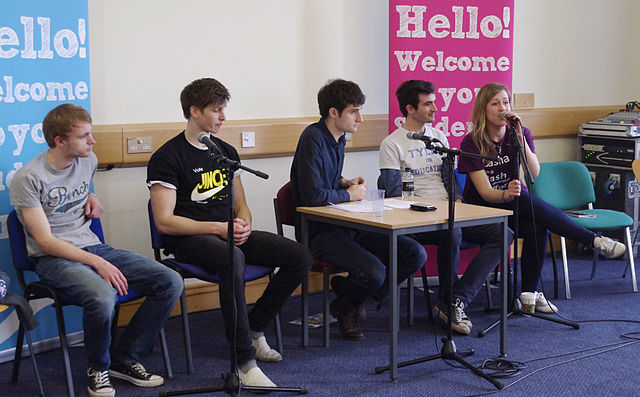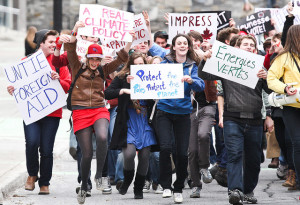Young people support the democratic process, but do not feel that they can exercise real influence over decision-making
As part of our series on youth participation, in this post Matt Henn and Nick Foard share findings from survey research into young people’s views of politics. They show that young people are supportive of the democratic process and want to participate in. However, the experience of elections is frustrating, with politicians seen as remote and self-serving. They argue for new forms of engagement including youth-focused constituency surgeries and forums.

Would local Question Time-style events and youth surgeries help engage young people? Credit: mattbuck, CC BY SA 2.0
Although it is recognised that many young people take an active role in alternative forms of participation (such as the 2011 student demonstrations in Britain and the global ‘Occupy’ movement), their lack of presence at elections often leads commentators and academics to write them off as apathetic and uninterested in democratic politics, or even as anti-political. Furthermore, the significant generational disparity in electoral participation rates results in the policy concerns of young people being given relatively little priority by the political classes; thus, when elected to office, politicians in government will tend to pursue policies that favour older and other more voting-inclined-groups at the expense of younger and more non-voting-inclined groups. This generational electoral divide, therefore, has serious implications for contributing to the deepening of existing generational social and economic inequalities.
Why don’t young people vote?
In our own research we have been considering why it is that young people do not vote and what might be done to re-engage them with the formal political and democratic processes. In 2011 we conducted an online survey with 1,025 young adults who were aged 18 at the time of the 2010 UK General Election. Perhaps surprisingly given the way that they are often characterised, our survey results indicate that nearly two thirds (63 per cent) of young people claim to have at least some interest in politics. But despite this, more than half (55 per cent) of them feel considerably ill at ease in terms of their own knowledge and understanding of British politics (only 36 per cent claim confidence in such matters). Worryingly, a very large majority (75 per cent) of today’s generation of young people do not feel that they can influence the decision-making process.
Interestingly, despite their reservations about how the system operates, young people are still more likely than not to express broad support for the democratic process, and approximately half state that they are committed to the principle of voting (57 per cent) and of the value of elections (48 per cent). Nonetheless, it should be noted that a significant number of young people appear to have lost faith in the democratic process –
in either voting (37 per cent) or in the electoral process (28 per cent).
So it’s not that young people don’t want to vote. Indeed, the majority of our respondents said they were considering voting at the next election (64 per cent). However, their first experience of a general election in 2010 has left many feeling deeply frustrated. The results from our project reveal that they consider professional politicians to be remote and self-serving, with no commitment towards championing young people’s concerns. The overwhelming majority (81 per cent) hold a negative view of the political classes, with very few admitting any trust in either the parties (8 per cent) or in politicians (7 per cent).
It is perhaps not surprising that a majority in our survey (57 per cent) claim that although elections allow voters to express their opinions, they don’t really change anything (only 15 per cent disagreed with this sceptical statement). Most importantly, young people need to feel that there is a party on offer that shares their own hopes and aspirations – in the absence of any such party, they don’t feel encouraged to vote. Thus, there is a noticeable gap between those who would only vote in an election if they cared who won (40 per cent) and those who disagreed with that particular view (27 per cent).
Re-connecting young people: The challenge for political parties
Evidence suggests that at the root of young people’s continuing disengagement from the political process is their deep scepticism of, distrust in, and aversion towards the political class. Our own research clearly indicates that if this generation is to be re-connected to the formal political process, then the onus is for these same political actors to intervene in ways that might help young people to see the potential value in doing so.
For instance, we asked an open question in order to find out what might be done to reverse young people’s antipathy towards, the political parties and professional politicians. The responses clearly indicate that young people believe that political parties should do more to directly connect with them, by talking with (7 per cent) and listening to them (16 per cent), by visiting schools, colleges and universities (10 per cent), and by using innovative connection methods such as questionnaires and surveys (10 per cent), holding “Question Time”-style forums, conferences and meetings (7 per cent), and using the Internet, social networking methods (such as Facebook and Twitter) and email (8 per cent). In addition, there is a similarly clear message that political parties and professional politicians should then action young people’s concerns. In particular, by adopting a more young person-centred approach and focus in their political work (6 per cent), by involving young people more in doing so (4 per cent), by championing the issues and concerns of young people (10 per cent), and by delivering on their promises (5 per cent).
Conclusion and policy proposals
What is needed is a thoroughgoing review of the way in which formal politics reaches out to, and prepares young people for, political participation. Young people are open-minded about electoral politics and do not have a hardened disaffection. They are more likely than not to express faith in voting and the democratic process although not with the politicians that inhabit that world. A reduction of the voting age so that 16 and 17 year-olds are eligible to vote in all future elections might well help to convince young people that they are valued by the political class, rather than maligned and excluded. This may well help to convert democratic commitment into democratic participation.
Related to this, a key question to be asked is, ’How do we get more young people thinking about politics in such a way that they actually want to go and vote?’ Extending the vote to 16 and 17 year-olds should be tied-in with measures to extend and enrich the citizenship curriculum in schools to improve young people’s political literacy and help make the idea of democratic participation second nature. Despite their broad support for the democratic process, young people’s recent experience of their first general election in 2010 has left them feeling disheartened and somewhat indignant about the political class. The onus is therefore on the political parties and professional politicians to take the lead in reaching out to connect with people – and young people in particular. This would be assisted by developing structures and approaches that enable this generation to see both the value of engaging with the political process, as well as feeling reassured that there are meaningful opportunities for them to do so. Certainly, young people would welcome an approach from the political parties and from individual politicians that was direct and clearly prompted by a desire to genuinely articulate and then champion the views and interests of young people.
In the run-up to the 2015 General Election, political parties should therefore hold regular youth constituency surgeries which are well publicised in schools, colleges, youth centres and other community centres that are frequented by young people. Parties should also develop policy forums aimed at young people which have the express purpose of listening to and talking with today’s youth generation. These policy forums should be both national and community-based to maximise the opportunities for young people to participate. They should be organised as face-to-face meetings that also include ‘Question Time’ events designed to create stimulating and open discussion of issues that are of significance to young people. They should also use the Internet, mobile technologies and social media to create an e-dialogue with young people that is open, transparent and welcoming – and which signals to young people that their views and active participation are considered of crucial value in shaping policy that captures the imagination, and embraces the interests, of today’s youth generation.
—
This post is part of a series on youth participation based on the Political Studies Association project, Beyond the Youth Citizenship Commission. For further details, please contact Dr Andy Mycock. An electronic copy of the final report can be downloaded here.
Note: This post represents the views of the author and does not give the position of Democratic Audit or the LSE. Please read our comments policy before responding.
—
 Matt Henn is a Professor of Politics and International Relations at Nottingham Trent University.
Matt Henn is a Professor of Politics and International Relations at Nottingham Trent University.
 Nick Foard is a Senior Lecturer in Sociology at Nottingham Trent University.
Nick Foard is a Senior Lecturer in Sociology at Nottingham Trent University.






 Democratic Audit's core funding is provided by the Joseph Rowntree Charitable Trust. Additional funding is provided by the London School of Economics.
Democratic Audit's core funding is provided by the Joseph Rowntree Charitable Trust. Additional funding is provided by the London School of Economics.
Young people support the democratic process, but don’t feel that they can exercise influence over decision-making https://t.co/5aPT7t9p5U
RT @aconneen: #CompGov MT @PJDunleavy: Lack of political efficacy by young people in the UK https://t.co/AfY8Gkozq5
@democraticaudit ‘Young people support the democratic process but don’t feel that they can exercise real influence’ https://t.co/ZtgL3sMGKd
Young people IN UK support the democratic process, but don’t feel they can exercise real influence on decision-making https://t.co/lT1UcNG6xp
Young people support the democratic process, but dont feel that they can exercise real influence over decision-making https://t.co/zumulWKOct
What happened to the spirit of 1968? https://t.co/MgKIeORtUO
Young people support the democratic process but don’t feel that they can exercise real influence over decision-making https://t.co/wuM1PGvro7
Another great post in the @PolStudiesAssoc @democraticaudit beyond the youth citizenship commission blog series https://t.co/TUkPqZNJ8e
Young people support the democratic process, but do not feel that they can exercise real influence over decision… https://t.co/XtwC9IBQfm
Young people support the democratic process, but do not feel that they can exercise real influence… https://t.co/a0lUaqVOMz